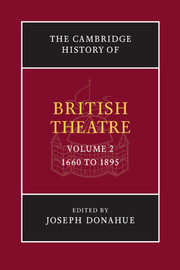Book contents
- Frontmatter
- Part I 1660 to 1800
- 1 Introduction: the theatre from 1660 to 1800
- 2 Theatres and repertory
- 3 Theatre and the female presence
- 4 Theatre, politics and morality
- 5 Theatre companies and regulation
- 6 The Beggar’s Opera A case study
- 7 Garrick at Drury Lane, 1747–1776
- 8 Theatre outside London, 1660–1775
- 9 1776 A critical year in perspective
- 10 The theatrical revolution, 1776–1843
- Part II 1800 to 1895
- Bibliography
- Index
- References
5 - Theatre companies and regulation
from Part I - 1660 to 1800
Published online by Cambridge University Press: 28 March 2008
- Frontmatter
- Part I 1660 to 1800
- 1 Introduction: the theatre from 1660 to 1800
- 2 Theatres and repertory
- 3 Theatre and the female presence
- 4 Theatre, politics and morality
- 5 Theatre companies and regulation
- 6 The Beggar’s Opera A case study
- 7 Garrick at Drury Lane, 1747–1776
- 8 Theatre outside London, 1660–1775
- 9 1776 A critical year in perspective
- 10 The theatrical revolution, 1776–1843
- Part II 1800 to 1895
- Bibliography
- Index
- References
Summary
The production of plays throughout this period was fundamentally affected by the duopoly established by royal command in 1660 and by the regulatory apparatus that controlled theatre companies and imposed censorship. The establishment of patent companies, shares of which could be sold to outside investors, tended to remove power from the hands of the actors. The patents also made the founding of additional companies almost impossible. Such companies did spring up between 1695 and 1705 and again after 1728, but for the most part they were suppressed by the Licensing Act of 1737. The passage of that act had dire consequences for British theatre not fully undone until the abolition of censorship in 1968. There is an enormous irony here. Theatres had been regulated by the Lord Chamberlain and all scripts censored by the Master of the Revels since back in the sixteenth century. Opposition to censorship was essentially non-existent: writers and actors alike accepted its propriety. The collapse of censorship early in the eighteenth century came about by accident, not because of a change in policy, and could not have been predicted. The ultimate result was reimposition of government control in much more drastic and damaging form in 1737.
The Carolean establishment
When the English monarchy was restored in 1660, concerted attempts were made in and around the court to return to the status quo ante as far as possible. Many such reinstatements were superficial and temporary, but theatre proved especially resilient, even though it too was ‘the same, only different’. Scholars have made much of the contrast between the flourishing free enterprise theatre system under Elizabeth I and the narrow, exclusive design inscribed into law when Charles II, upon his return, granted a joint patent monopoly to Thomas Killigrew and Sir William Davenant.
- Type
- Chapter
- Information
- The Cambridge History of British Theatre , pp. 108 - 125Publisher: Cambridge University PressPrint publication year: 2004
References
- 4
- Cited by



